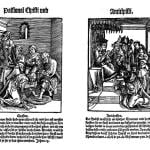correspondent asked me the following questions and agreed for me to
put them to my blog readers:
One question for cessationists would concern John 16:13:
When the Spirit of truth comes, he will guide you into all the truth, for he will not speak on his own authority, but whatever he hears he will speak, and he will declare to you the things that are to come.
In micro terms, what does that mean? Pastor Shaun and other cessationists might say that these words were literally for Jesus’ 11 disciples (Judas having gone out) and no one else. Slighly broader, a cessationist might say this text is for the canon-forming era only, not just the 11 and Matthias and Paul.
If cessationists don’t believe John 16:13 applies to us today (and perhaps they do) they have to make the case for restricting Jesus words to the Eleven or to the first century apostles. Prima facie Jesus words are for all believers unless cessationists cans show why it should be restricted only to first century Apostles. Perhaps they can.
Let’s say John 16:13 is for believers today as well as the Eleven. My question: if the Spirit is promised by Jesus to come and guide us into all truth, how does that work in the most micro of situations?
What does that look like? To be sure, at the least it means through Scripture. But is that all it means? For those who are opposed to “impressions”, how does the Spirit guide us into “all” truth? If one denies impressions, then does one deny that the Spirit can “bring to mind” Scriptural texts? Or do cessationists interpret this promise to mean the Spirit can bring Scriptures to mind but nothing else? But even bringing Scriptures to mind seems to me like…an impression.
Related, James tell us to ask for wisdom. How does that work in micro terms?
Let’s take the moment immediately preceding God’s answer of that prayer when one lacks wisdom. What specifically changes from the moment of lacking wisdom to the moment of receiving wisdom from God? What constitutes the actual wisdom– words? thoughts? arguments? discernment?
So a related question would be, for the type of cessationist that denies impressions, how does such a cessationist distinguish between wisdom given by God and impressions?
















